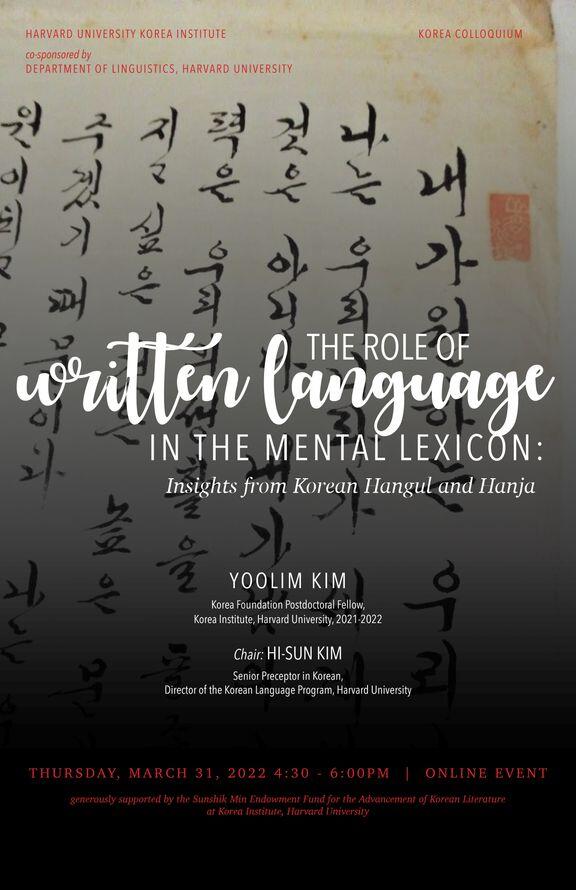Date:
Location:
Korea Colloquium
Co-sponsored by Department of Linguistics, Harvard University

Yoolim Kim
Korea Foundation Postdoctoral Fellow, Korea Institute, Harvard University, 2021-22
Yoolim Kim is a postdoctoral fellow at the Korea Institute, funded by the Korea Foundation. Previous to Harvard, she was a postdoctoral researcher in the Minds and Traditions Research Group at the Max Planck Institute for the Science of Human History in Jena, Germany, where she researched letter shapes of writing systems. Specifically, she used machine learning techniques to investigate what enables visual perception of letters and to develop the beginnings of a visual morphology. Yoolim completed her PhD in Psycholinguistics at the University of Oxford in 2019, where she examined the mental representation of language and the role of script in processing in Korean. She was funded by the Clarendon Scholarship. She also completed an MPhil before her PhD in the same faculty at Oxford in 2015. Before Oxford, she received her BA in Cognitive & Linguistic Sciences from Wellesley College in 2012.
Chaired by Hi-Sun Kim, Senior Preceptor in Korean, Director of the Korean Language Program, Harvard University
Abstract:
How do differences in script influence language processing? For psycholinguistics, Korean offers a powerful lens through which to investigate this question. Although contemporary Korean is written primarily using Hangul (a morpho-phonemic system), more than half the lexicon (excluding English loan words) comprises words of Sino-Korean origin and can also be rendered in Hanja (Sinographic characters). Despite Hanja’s limited written visibility in contemporary Korean, the large number of Sino-Korean homophones can be semantically disambiguated through Hanja (e.g., in dictionaries, some news media, and scholarly publications). This dynamic, if uneven, relationship between Hangul and Hanja allows psycholinguists to reconsider the role of writing in what is called the “mental lexicon.” The mental lexicon refers to the total sum of information a speaker has about the grammaticosemantic elements of a language (i.e., “words”). One question that remains a source of robust debate is whether the mental representation of language is shaped by the way that it is written. What can written Korean tell us about how the brain encodes the relationship between written and spoken language? If most attention has focused on Western European languages with Latinate scripts, how can Korean help us reexamine the cognitive processes that underpin reading, writing, and successful language comprehension? Ultimately, the rich complexities of written Korean help us ask a bigger question: what is the role of writing systems in language more generally?
***
To attend this online event, please register here.
Generously supported by the Sunshik Min Endowment Fund for the Advancement of Korean Literature at the Korea Institute, Harvard University